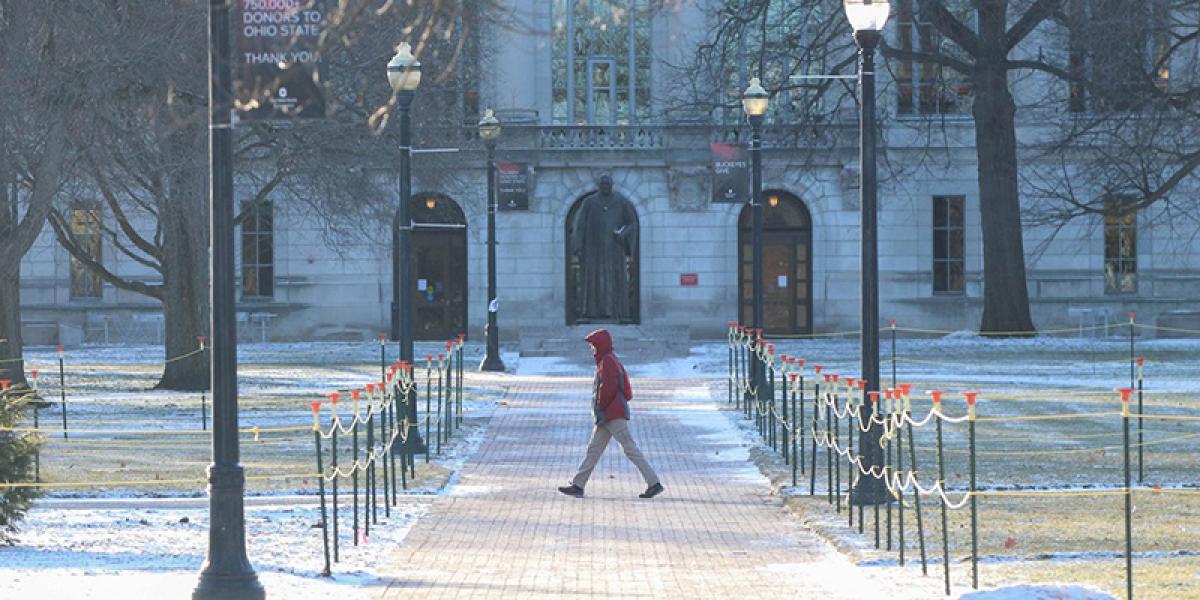A sustainability leader from Ohio State is weighing in on the climate change phenomenon. The Commonwealth Fund recently invited Aparna Dial, senior director of sustainability and strategic services, to be part of a virtual panel.
The Commonwealth Fund was founded in 1918. The organization’s mission is to promote a high-performing health care system that achieves better access, improved quality, and greater efficiency, particularly for society’s most vulnerable, including low-income people, the uninsured, and people of color.
Panelists discussed climate change and healthcare delivery with the Board of Directors. Dr. Michael Drake, former president of Ohio State, serves as the chairman.
“We had a robust discussion,” Dial said. “I feel privileged to have had the honor to talk to them about the future of climate change because this is very important.”
The panel also included Gary Cohen, president of Health Care Without Harm, Dr. Bruce Siegel, president & CEO of America’s Essential Hospitals, and Dr. Nicholas Watts, chief sustainability officer of NHS England.
“Health equity, racial inequity and climate change. You can’t separate them.” Dial said. “The vulnerable are disproportionally affected by heatwaves, floods and droughts and the same goes with pollution.”
Climate change refers to long-term shifts in temperatures and weather patterns. This year, the United States set a target to reduce emissions by 50 to 52% below 2005 Levels in 2030.
Studies show the health care industry is among the most carbon-intensive service sectors in the industrialized world. It’s responsible for 4.4 to 4.6 percent of worldwide greenhouse gas emissions.
Dial discussed Ohio State’s journey, top priorities, and how climate change is making a difference in the university’s health system. The creation of the Facilities Operations and Development (FOD) Sustainability Office in 2004 played a key role.
“Under Dr. Drake’s leadership, we adopted institution-wide sustainability goals in the areas of teaching and learning, research and Innovation, outreach and engagement and Resource Stewardship in 2015. Our priorities are aligned with our institution-wide goals,” Dial said.
In the area of teaching and learning, thousands of students take part in more than 900 courses that support sustainability learning. A group of medical school students, residents, fellows, faculty, deans and practicing clinicians are currently working to integrate climate change, health, and environmental justice issues into the College of Medicine and the School of Health and Rehabilitation’s existing curriculum, as well as professional development offerings for established physicians.
When it comes to university research and innovation, more than 600 faculty members are engaged in sustainability research across a breadth of disciplines including natural and physical sciences, social and behavioral sciences, engineering, public health, business, law, planning, policy, arts and humanities.
“Climate change is a multidisciplinary issue not just a public health problem,” Dial said. “It is an engineering and science dilemma and we also need the arts, behavioral and social scientists engaged in creating change.”
Dial says Ohio State’s outreach and engagement goal is about creating a culture of sustainability on campus and in the community through commitments and local and global partnerships. The university has also pledged to achieve carbon neutrality by 2050, and President Kristina Johnson has expressed a desire to accelerate that goal to 2040.
The school is a founding member of the University Climate Change Coalition, an alliance of research universities committed to climate action and cross-sector collaboration on campus, in communities, and on a global scale. Involvement in the Race to Zero Waste campaign and the creation of the Wexner Medical Center Green Team also help raise awareness of Ohio State’s sustainability goals.
“It’s very important from a teaching and learning, research and innovation and outreach and engagement perspective because we are making future clinicians who have to practice in this world,” Dial said.
Ohio State also created a $1 Billion partnership with Ohio State Energy Partners in 2017 to closely monitor campus energy management.
“Our mutual goal is to cut energy usage by 25% on a per square footage basis over ten years,” Dial said.
Dial says there are opportunities to help combat climate change. She says there is a need for education and preparing future leaders. The health care and public health workforce is diverse, with different levels of training and scientific expertise, various roles and responsibilities, and consequently contrasting opportunities to influence change and facilitate solutions to the climate crisis.
“There is no one-size-fits-all curriculum or educational approach that should be applied to all health care workers,” Dial said. “In the absence of strong government or trans-sectoral policy initiatives and programs in climate change and health, climate and health educational programming in the U.S. is heterogeneous and fragmented.”
Panelists also offered commentary on ways the Commonwealth Fund can make a difference in the next few years and how to utilize its resources given the group’s history and capabilities.
Dial suggested developing a health equity action fund and programming to dismantle systemic racism in health care policy and practice and counter inequity in treatment, patient experience, and health outcomes for minorities.
“Conduct research to draw explicit connections between climate change and its inequitable impact on mental illnesses, people with low-income, communities of color and immigrants with limited English proficiency,” Dial said. “Even if research funding is limited, explicitly stating these connections on the website and other educational collateral would be powerful.”
Controlling healthcare costs and bolstering the healthcare system could also help make a difference.
“Health systems should be increasingly strengthened so that they continue to be efficient and responsive to improve population health in an unstable and changing climate,” Dial said.
Dial also encourages the group to start collaborating with other organizations that have similar goals and aspirations.

